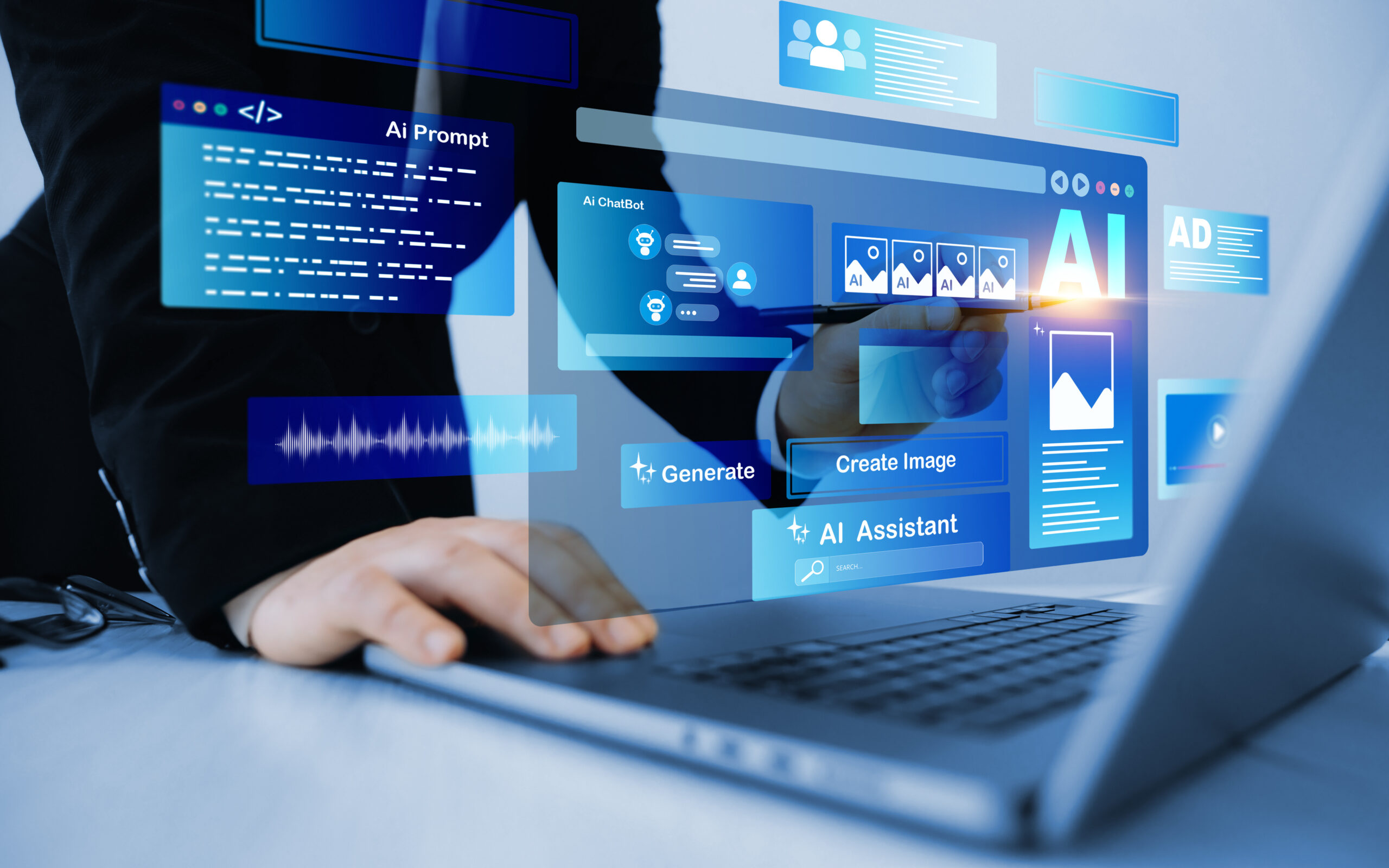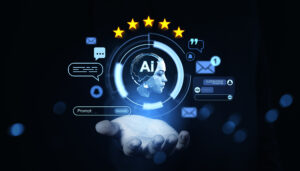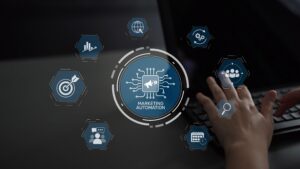How is AI-powered marketing reshaping the traditional funnel from awareness to purchase? What makes AI-powered marketing more effective than traditional analytics and automation? Can AI-powered marketing truly deliver personalization at scale while maintaining customer trust?
The blog explores how AI-powered marketing is transforming the traditional marketing funnel into a dynamic, data-driven journey. Instead of relying on static demographics and guesswork, marketers now have access to real-time insights, predictive analytics, and hyper-personalized touchpoints that guide customers seamlessly from awareness to purchase. From smarter audience segmentation to predictive content delivery, AI enables businesses to engage with precision and efficiency at every stage of the funnel.
Beyond automation, AI-powered marketing thrives on adaptability. By learning from vast datasets, AI can optimize campaigns in real time, test countless variations, and even anticipate customer behavior. The blog highlights practical examples like AI-driven chatbots, predictive lead scoring, and dynamic pricing, while also addressing ethical considerations such as transparency and bias. Ultimately, AI doesn’t just optimize marketing—it redefines it, unlocking new opportunities for conversions, loyalty, and long-term growth.
If you work in marketing or any marketing-adjacent field, you’re probably intimately familiar with the marketing funnel. It’s the journey a customer takes from the moment they first become aware of a brand to the point of purchase.
Traditionally, this funnel has been viewed as a linear progression, moving customers through stages like Awareness, Interest, Consideration, Intent, Evaluation, and Purchase. Each stage required specific tactics, often relying on broad segmentation and a significant amount of educated guesswork.
But with AI becoming a more widely used tool in digital marketing, the strategies are changing.
Marketers aren’t confined to analyzing past campaign performance or relying solely on demographic data anymore. AI-powered marketing gives data scientists and marketing teams the power to understand customer behavior in real-time, predict future actions, and personalize every touchpoint with exceptional precision. It’s not just about automating tasks; it’s about injecting intelligence into every stage of the journey, making it a dynamic, responsive, and ultimately more effective system for driving conversions.
The key difference between AI-powered marketing and traditional analytics and automation lies in AI’s ability to learn and adapt. Traditional analytics provides insights into past performance, while basic automation executes pre-defined rules. Conversely, AI can analyze vast datasets, identify complex patterns, and make autonomous real-time campaign adjustments, constantly optimizing for better results.
Let’s break down and explore the AI marketing funnel, stage by stage.
Table of Contents:
Enhancing the Awareness Stage with AI
AI-Powered Predictions & Content Creation
Increasing Engagement in the Interest & Consideration Stages
Nurturing Leads Through Intent & Evaluation Stages
Converting Prospects in the Purchase Stage
Post-Purchase Optimization & Retention
Ethical Considerations & AI Transparency
Future Trends in AI & Funnel Optimization
Enhancing the Awareness Stage with AI
At the top of the funnel is the Awareness stage, and this entry point is all about making a good first impression and reaching the right audience. In the past, this often involved casting a wide net through broad advertising campaigns and hoping you’d catch something worthwhile. But now, AI-powered marketing enables a far more sophisticated and efficient approach.
AI-driven audience segmentation and targeting go far beyond basic demographics. These algorithms can analyze various data points, including website behavior, social media activity, purchase history, and even intent signals gleaned from online searches, to identify highly specific micro-segments of your audience with incredible accuracy.
This allows marketers to move away from generic messaging and deliver highly personalized messaging and campaigns to the individuals who are more likely to be receptive to it. Not only is this a major efficiency boost, but it’s also a time-saver.
Personally, one of the biggest draws of AI marketing for me is the way it prevents us from wasting time on tedious tasks or busywork that leads nowhere. With AI-powered marketing, everything is intentional and backed by data.
AI-Powered Predictions & Content Creation
AI can also power predictive reach and timing. By analyzing historical campaign data and real-time user behavior, these algorithms can forecast the best times and channels to reach specific segments, maximizing campaign impact and reducing wasted ad spend. A lot of successful digital marketing is about showing up in the right place at the right moment, and AI makes this much easier to manage.
AI is also revolutionizing content creation and personalization at scale. This goes beyond simply inserting a customer’s name into an email subject line to make it feel like it was written just for them. AI-powered marketing tools can generate variations of ad graphics, social media captions, and even short video snippets tailored to individual users’ specific interests and preferences within a targeted segment. I talk a lot about this in my book, Data (De)coded, and how brands like Spotify already leverage AI to personalize the customer experience, with curated playlists, immediately grabbing a listener’s attention with content directly aligned with their musical tastes—past, present, and future.
This level of hyper-personalization in the awareness stage dramatically increases the likelihood of capturing a customer’s interest and drawing them further down the funnel. Really, everything that happens in this stage sets the tone for the rest of the journey, which is why it’s absolutely critical to start strong.
Increasing Engagement in the Interest & Consideration Stages
Once someone is aware of a brand, the goal of the Interest and Consideration stages is to deepen their engagement and provide them with the information they need to evaluate whether your product or service is the right fit. AI can be extremely helpful in nurturing this interest and guiding them through the consideration process.
Natural Language Processing (NLP) powers intelligent chatbot interactions and content recommendations, and one brand that does this exceptionally well is Sephora. The makeup giant’s AI-powered chatbots aren’t just simple Q&A bots. NLP allows these chatbots to understand the nuances of human language, provide personalized advice, answer complex questions, and even guide users through product selection based on their individual needs and preferences. It acts more as a personal shopping assistant than a standard chatbot.
AI-powered marketing algorithms can also analyze a user’s browsing history and content consumption patterns to recommend relevant blog posts or product demos, keeping them engaged and informed. Imagine interacting with tech that already knows where you’ve been in the customer journey, so instead of repeating old information, they guide you to someplace new, offering you real value.
A/B Testing
AI takes dynamic A/B testing and multivariate optimization to a whole new level. Traditional A/B testing often involves manual setup and analysis of a limited number of variations. AI can continuously test countless variations of website elements, landing pages, email subject lines, and call-to-action buttons in real time, automatically identifying and implementing the highest-performing combinations without your constant interference. This data-driven optimization ensures that engagement is constantly maximized.
Moreover, sentiment analysis provides invaluable insights into how customers react to your brand and messaging. AI can analyze social media mentions, customer reviews, and chatbot interactions to gauge overall sentiment and identify specific areas of concern or positive feedback. This allows marketers to adjust their messaging and content in real time, addressing concerns and reinforcing positive perceptions, ultimately strengthening engagement during the interest and consideration phases.
Nurturing Leads Through Intent & Evaluation Stages
As customers move into the Intent and Evaluation stages, they signal a higher interest level and actively compare potential products or solutions. AI can help nurture these leads and provide them with the personalized information and support they need to move closer to a purchase.
Behavioral tracking and predictive lead scoring are powerful AI-driven tools. By analyzing customer interactions with your website, emails, and other touchpoints, AI algorithms can identify patterns that indicate a high likelihood of conversion. Predictive lead scoring assigns a numerical value to each lead based on these behaviors, allowing sales and marketing teams to prioritize their efforts on the most promising prospects.
AI-driven email and retargeting campaign optimization ensures that leads receive timely and relevant communications. AI can analyze past email engagement data to determine optimal send times, personalize content based on a lead’s specific interests, and automatically adjust retargeting campaigns to re-engage anyone who showed strong intent but hasn’t converted. Personalized nurturing like this keeps your brand top-of-mind and guides leads through their evaluation process.
Personalization engines powered by AI excel at providing tailored product/service recommendations based on browsing history, past interactions, and stated needs. As seen with Zillow’s AI-driven home recommendations and Wayfair’s personalized product suggestions, this level of individualization enhances the evaluation process and makes it easier for customers to find the perfect solution.
Converting Prospects in the Purchase Stage
The Purchase stage is the moment of truth, and AI can significantly optimize the conversion process and turn interested prospects into paying customers.
Dynamic pricing models leveraging machine learning can help businesses optimize revenue. AI algorithms can analyze factors like demand, competitor pricing, and customer behavior to automatically adjust prices in real-time, maximizing conversion rates and profitability. This ensures that pricing is competitive and aligned with customer willingness to pay.
Real-time conversion optimization (CRO) with AI-generated UI/UX suggestions can address potential roadblocks in the purchase process. AI can analyze user behavior on checkout pages, identify areas of friction, and even generate suggestions for UI/UX improvements that are likely to increase conversion rates. This continuous optimization ensures a smooth and seamless purchasing experience.
AI-enabled checkout processes are also becoming increasingly prevalent. Chatbots can guide users through checkout, answer last-minute questions, and even offer personalized discounts to incentivize completion. It boils down to meeting the customer where they are and giving them whatever nudge they need to complete their purchase.
Post-Purchase Optimization & Retention
I know it may seem the opposite, but the marketing funnel doesn’t actually end at the purchase. The Post-Purchase stage is crucial for building customer loyalty and driving repeat business. Like much of the marketing funnel, AI plays a pivotal role in optimizing this stage.
AI in customer feedback analysis and churn prediction provides valuable insights into customer satisfaction. AI can analyze customer reviews, support tickets, and survey responses to identify key areas of satisfaction and dissatisfaction. Moreover, churn prediction models can identify customers at high risk of leaving, allowing businesses to intervene with personalized offers or support to retain them before it’s too late.
AI-powered marketing tools can also personalize reward offers based on a customer’s purchase history and engagement, making loyalty programs more relevant and effective because they’re tailored to each person’s habits and preferences.
Marketers can also use AI-powered marketing tools to identify opportunities for upselling and cross-selling. By analyzing a customer’s purchase history and browsing behavior, AI can recommend complementary products or higher-tier services they’re likely to be interested in, increasing customer lifetime value and driving additional revenue. Think of Starbucks’ personalized rewards system here. It issues rewards and incentives in-app based on individual customer order history and engagement to not only drive more sales, but also to foster a lasting customer relationship.
Ethical Considerations & AI Transparency
As we increasingly rely on AI to optimize the marketing funnel, we have to address the ethical considerations that arise. Data privacy and responsible AI use must be top priorities in marketing and other areas. Businesses must be transparent about how they’re collecting and using customer data and ensure compliance with all relevant privacy regulations.
There’s also algorithmic bias to contend with. AI models trained on biased data can perpetuate and even amplify existing societal inequalities, leading to discriminatory marketing practices, which are incredibly harmful even if unintentional. Continuous monitoring and auditing of AI algorithms is essential to identify and mitigate potential biases.
Finally, maintaining transparency in automated decision-making builds trust with customers. The inner workings of AI can be complex, but businesses should strive to provide clear explanations of how AI-powered marketing influences the customer experience. This foundation of trust can go a long way.
Future Trends in AI & Funnel Optimization
The evolution of AI-powered marketing is really just beginning. We’re on the cusp of even more transformative trends that will continue to revolutionize how we approach the marketing funnel.
For example, the rise of generative AI promises to unlock new levels of creativity and efficiency. Imagine AI autonomously generating entire marketing campaigns, from ad copy to landing page content, all tailored to specific audience segments.
There’s also the integration of AI across omnichannel platforms to create seamless and personalized customer experiences. AI will connect the dots between a customer’s interactions across different channels from social media to the in-person store, providing a consistent brand experience across all touchpoints.
Lastly, the anticipated impact of AI agents and autonomous marketing systems could lead to a future where AI handles routine marketing tasks, freeing humans to focus on more strategic and creative work, all while being present to build genuine human connections with their audience.
The journey from clicks to conversions is becoming increasingly intelligent, driven by AI-powered marketing strategies. By embracing these advancements with intention, businesses can unlock newfound levels of efficiency and success in their marketing efforts.








